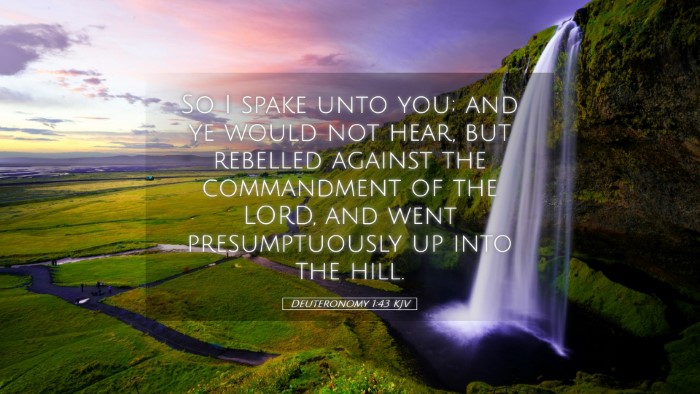Commentary on Deuteronomy 1:43
Verse Context: Deuteronomy 1:43 states, "So I spoke to you, and you did not listen; but you rebelled against the command of the Lord and presumptuously went up into the hill country." This verse occurs in the narrative of the Israelites prior to their entrance into the Promised Land, illustrating the consequences of disobedience to God's commands.
Overview
This verse serves as a pivotal reminder of Israel’s repeated struggles against God's directives. Within the framework of Deuteronomy, the emphasis is laid on covenant obedience, urging Israel to remember their past failures and learn from them. The commentary from various perspectives provides deep insights into the spiritual significances of this rebellion.
Commentary Insights
Matthew Henry's Commentary
Matthew Henry indicates that Israel’s insubordination here reflects a larger theme of rebellion against divine authority. He emphasizes that God's commands were clear, yet the people, driven by fear and doubt, chose to act contrary to His guidance. This disobedience is not merely an act of defiance but a rejection of trust in God’s promises, which leads to dire spiritual consequences.
Key Observations
- The nature of rebellion: Henry points out that the root of their rebellion lay in a lack of faith in God's ability to deliver them from the inhabitants of Canaan.
- Presumption in action: The term "presumptuously" suggests an arrogance in their attempt to overcome their enemies without God's authorization.
- Consequences of disobedience: Henry argues that the disobedience eventually results in wastage of opportunities and the subsequent suffering that follows when one chooses to ignore divine counsel.
Albert Barnes' Notes
Barnes elaborates on the lack of receptiveness from the Israelites to Moses’ warning. He reflects upon the serious spiritual implications of their choices, illustrating God’s desire for obedience and the corresponding accountability for disobedience. His commentary highlights the stark contrast between God’s intentions for prosperity in Canaan and the Israelites' devastating choices to act independently.
Key Insights
- Rejection of God’s advice: Barnes underscores the tragic irony of the Israelites who, having spurned divine guidance, sought to claim victory through their own power.
- The danger of self-reliance: He warns of the folly in presuming upon God’s grace while acting against His clear directions, advocating for the necessity of humility and reliance on divine wisdom.
Adam Clarke's Commentary
Clarke provides additional context by emphasizing the tactical and spiritual ramifications of this act of rebellion. He notes that such acts are often fueled by fear and misunderstanding of God’s assurance. Clarke also elucidates the notion of moving forward without divine approval and the inherent risks of such a path.
Important Themes
- The principle of divine protection: Clarke asserts that in rejecting God’s counsel, the Israelites exposed themselves to danger and failed to appreciate the protective nature of God’s commandments.
- Understanding God’s ways: He challenges readers to grasp the significance of waiting on the Lord and adhering to His strategies rather than succumbing to fear-driven impulses that often lead to deadly misjudgments.
Application for Life and Ministry
The lessons derived from Deuteronomy 1:43 go beyond historical recounting; they resonate powerfully with contemporary believers. This commentary serves to remind pastors, theology students, and scholars that God’s commands remain vital for both personal and communal faith journeys.
Contemporary Relevance
- Faith amidst adversity: Just as Israel faltered in confidence, believers today must confront the tendency to rely on human reasoning in challenging circumstances.
- The importance of obedience: Spiritual leaders are reminded of the weight of leading a community that listens to God's voice, as failure to do so can lead to collective downfall.
- Seeking God’s will: Individuals should prioritize a prayerful approach to decision-making, ensuring that actions align with divine instruction rather than impulsive desires.
Conclusion
Deuteronomy 1:43 encapsulates profound truths about human nature, divine authority, and the spiritual importance of listening to God’s commands. By reflecting on historical accounts through the lenses of these commentaries, we gain greater insight into the obstinate human heart and the character of a God who guides, protects, and desires obedience from His people.


